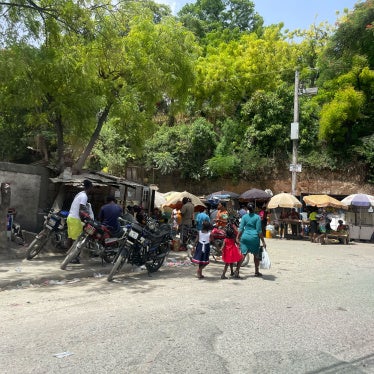As told by Liesl Gerntholtz and Meghan Rhoad
It's mid-November, and we're weaving through the Champs de Mars camp. The tent city sits on the plaza before Haiti's collapsed Presidential Palace, a once majestic building that is now a heartbreaking monument to the earthquake's devastation.
As we walk, children dart back and forth around women washing clothes before stopping to giggle and watch us with curiosity. Over the strains of kompa music coming from a radio, there is a rattling of pots and pans, but the gaunt faces that look up as we approach tell us that there is not enough to eat.
A row of toilets sits at the edge of the camp. Toilets are in desperately short supply, and many residents have resorted to defecating in plastic bags. Some plastic outhouses have been spray painted with the word "kolera," conveying the panic caused by the outbreak. When we saw the toilets, I immediately thought of safety. Many are located at the edge of camps with no nearby lighting, leaving woman who use them at night vulnerable to sexual assault.
We reach the shack where we'll be doing interviews, and the women begin to come. One after another, they arrive, anxious to tell their story. Soon the space is full. Even with two researchers, it may be hours before we talk with all of them individually. Many of the women are pregnant or carrying infants, and we're concerned that they'll find waiting uncomfortable. But they wait. With visible determination, they wait to be heard.
In fact, they have been waiting for months. Since the earthquake, women in the camps have been waiting to have their rights recognized, waiting to feel safe. And many of these women and girls have paid a high price - often rape or sexual assault - because this urgent need hasn't been addressed.
In the immediate aftermath of the January 12 quake, Human Rights Watch conducted an emergency research mission to assess the human rights situation in the camps. At that point, we documented the urgent need for attention to women's safety. We met the women who had suffered for those neglected needs, including a young woman who was raped, forced to perform oral sex, and brutally beaten by five men who kidnapped her at the edge of the camp.
On the basis of this on-the-ground fact finding, we began ringing the alarm bells. We told the United Nations, humanitarian agencies, the Haitian government, and the press the dangers that needed to be immediately addressed. We told them about the limited or non-existent policing in many camps, the lack of lighting. Men's and women's toilets needed to be separated. The lack of bathing facilities forced women and girls to wash themselves in the open, while others watched.
Understanding the scale of the humanitarian crisis and the work needing to be done, we saw these as the first basic steps.
Our calls were heard and some steps were taken, but our trip in November made plain that we must continue to document and raise our concerns about the unique problems faced by women in emergency situations - concerns that often get lost in crisis response.
Ten months after the earthquake, the stories women told us sounded startlingly familiar to those we heard before - young girls pinched and grabbed by boys as they bathed in the open; women abducted and assaulted; victims asked for gas money by police in order to investigate rapes.
The women talked about not having enough food or adequate shelter for their children. These women had no jobs and they didn't receive food aid. Some said they had slept with men in exchange for food - desperate, risky behavior that increased the likelihood that someone could harm them. They also had little or no access to medical care.
But today, the burgeoning cholera epidemic gave us new concerns: will the resources needed to fight cholera mean that there will be less for women's safety? If pregnant women contract cholera, will they be allowed to deliver in hospitals? If not, where will they go? Will women who survived cholera be shunned by society and physically isolated because the disease's stigma, something that would increase their risk of being attacked?
We don't expect these issues to be solved overnight, nor can we blithely assume that these issues will be solved with the passage of time. Sadly we know from other contexts - like the Dadaab refugee camps in Kenya, set up in 1991 and 1992 - that basic security problems can persist for years. Progress requires consistent advocacy and communication with humanitarian organizations and governments to ensure that women's rights are made a priority.
Back at the Champs de Mars camp, we were coming to the end of an interview with Natasha. She's a single mother with eight children and is kept awake at night by fears for her family's safety, and, often, by the rain coming through the holes in their battered tent. We thanked her for her willingness to talk with us, sharing with her our plans for using the information to advocate on behalf of women in Haiti's camps. She nodded and, after a pause, said, "All I ask is that you promise to work hard and do your job well."
That's a promise we plan to keep.



